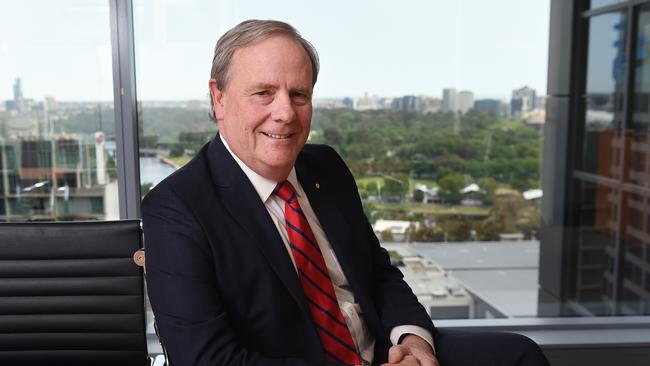Future Fund waves goodbye to never-never land (and so should you)
The highly profitable Future Fund offers a timely warning for everyday investors who have bet on over-valued investments, notably in technology.

Typically tight-lipped, the leaders of the Future Fund have broken with tradition and spelt out a clear pathway for everyday investors: focus on value, take comfort in Australia’s big miners and exit the never never-land of overpriced technology stocks, it says.
Even though the Reserve Bank might have held off making any move on rates, Future Fund chairman Peter Costello and chief executive Raphael Arndt have called time on easy investment market wins amid rising inflation.
As Arndt said: “It’s become more and more expensive to hold a position that doesn’t generate any income where the returns are in the never never-land, relative to investing in companies that throw off cash and real revenue.”
Sitting pretty on a knockout 19 per cent return for the last year, the fund also gave a thumbs up to “active management” as a way to achieve higher returns, a position that may send a shudder through the booming exchange-traded fund sector that has surfed on broadly higher markets.
Any switch by investors back to active fund managers who charge higher fees than ETFs will come with higher costs. But it is clear the Future Fund believes investors should be willing to pay managers fees if they can bring in higher returns.
Arndt said the fund was willing to pay managers to get the best returns, particularly in infrastructure property and private equity.
“There are plenty of options for investors, but of course it costs money to access those strategies,” he said.
Though the $200bn fund pulled back on its exposure to the sharemarket over the last three months – the adjustment was modest – it cut its overall shares exposure by 2 per cent.
Overall, the fund remains in a neutral risk setting, indicating it is not anticipating very weak markets but rather less rewarding and volatile markets where selection will determine the winners.
More importantly, the nation’s best known institutional investor has signalled a substantial internal shift in how it approaches investment returns by no longer seeking to eke out the benefits of central bank money printing and choosing instead to chase returns in selected asset classes – on the sharemarket, that clearly means value shares.
“We’ve got quite a tilt to value and quality stocks, which would seem more likely to perform in a rising inflation, rising interest rate environment relative to growth stocks,” Arndt said.
Meanwhile, Costello pointed out that profitless high-multiple technology companies “will have to deal with a new world”.
The warning on technology stocks will be read as a warning not just on stocks in the all-technology index, but all tech-related investments as diverse as buy now, pay later stocks or cryptocurrency-related investments.
Usefully, Costello also identified materials and resources sectors as areas that would “probably” continue to be reasonable. The recent switch towards value-focused companies that pay a reliable dividend stream has seen an outperformance among the bigger miners on the ASX.
On the wider issue of asset allocation, the fund gave little encouragement to investors wishing to put money into the bond market. “It is not a great time to start a business investing in nominal bonds,” Arndt suggested.
With the rise of bond-based ETFs, Australian retail investors who traditionally had little direct exposure to bond investing now have substantial holding through a range of ETFs that are generally dominated by nominal bonds, which are not inflation-linked.





To join the conversation, please log in. Don't have an account? Register
Join the conversation, you are commenting as Logout